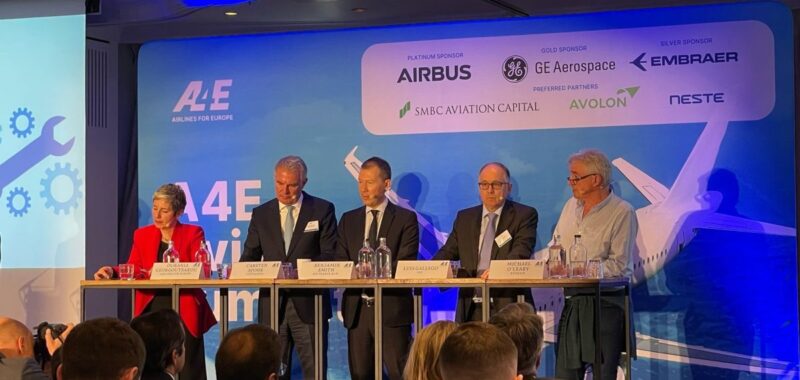The chief executives of four of Europe’s biggest airlines urged the EU to delay rules requiring the use of sustainable aviation fuel (SAF) because of concerns over supply.
The EU requires all airlines operating in the region to use a proportion of SAF in its jet fuel mix. They must currently use SAF for 2% of the fuel mix but that will ramp up to at least 6% by 2030. The UK has a similar mandate that will rise to 10% in 2030.
The European Commission told Skift it rejects the calls for a delay: “We consider the current SAF targets to be realistic and feasible,” a spokesperson said in a statement. “We have reaffirmed to stay the course of the European Green Deal and will therefore stick to these targets. The focus is now on their implementation, and we will offer support where needed.”
Benjamin Smith, CEO of Air France-KLM, was among the airline bosses at an aviation industry event in Brussels Thursday who spoke about the targets. “They want us to use SAF. Well show us where the SAF is. Realistically, the SAF does not exist. We don’t see it,” he said.
Lufthansa chief executive Carsten Spohr added: “We need to cut and revise EU regulations quickly.”
Luis Gallego, CEO of British Airways owner IAG, blamed fuel producers for turning their back on greener fuels. “The oil producers say that they are not producing enough because they prefer to allocate the capital in fossil fuel or other activities,” he said.
Ryanair CEO Michael O’Leary agreed and said that fuel producers told him they will not meet or have sufficient supply of SAF by 2030. “I don’t want to abandon those commitments, but I think it’s clear that the EU is going to have to move to the right,” he said. “We don’t see a path toward the amount we need to reach the mandate. It needs to take the pressure off us and put it on the people who actually produce the SAF.”
SAF Supply Challenges
On the same day the airline executives spoke, Boston Consulting Group (BCG) published a report showing that fuel producers are falling behind on SAF production.
BCG surveyed over 500 aviation industry executives and found that airlines and airports are investing only 1% to 3% of their revenue into SAF. High production costs and fuel prices remain the major challenges, the report said.
Fuel Industry UK, which represents oil majors such as BP and Exxon Mobil, told Skift it believes the targets will be met.
“Fuel companies are working hard to supply their obligations to meet the targets. We believe that the targets are realistic and can be met,” a spokesperson from Fuel Industry UK said.
‘Trump is upturning everything’
The aviation executives also warned that Europe’s sustainability targets could result in the region’s air travel industry becoming less competitive, while President Donald Trump moves towards deregulation in the United States.
“Yes we have to be net zero by 2050 but competition is where it’s going to be. Everything is going to be subject to making the industry more competitive,” said O’Leary. “Trump in the White House is upturning everything. Europe is going to have to respond to that.”
While the future of SAF is still uncertain in the United States, a report from the non-profit climate group Climate Catalyst suggested that conservative states are benefiting from green jet fuel incentives, which has led experts to believe that SAF will not be dismantled in its entirety there.
EU transport director Magda Kopczyńska previously defended the EU’s SAF policy, saying production is increasing.
“Seven years ago nobody talked about alternative fuels in aviation. What we put in place are requirements for airlines to gradually have more SAF in the fuels they use,” she said at the Destination Europe summit in February.
Skift’s in-depth reporting on climate issues is made possible through the financial support of Intrepid Travel. This backing allows Skift to bring you high-quality journalism on one of the most important topics facing our planet today. Intrepid is not involved in any decisions made by Skift’s editorial team.

